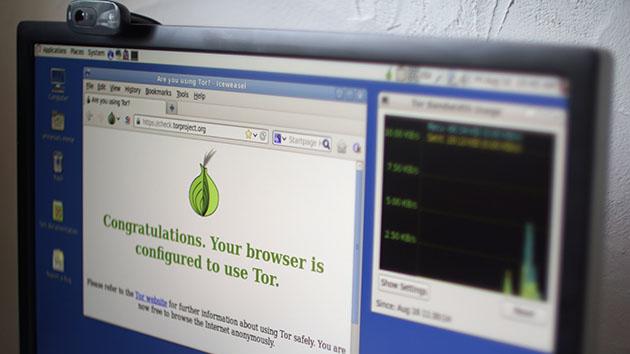anonymity
Latest

Snap bans anonymous messaging from third-party apps
Meetup and friend-finding apps will be restricted to adults.

Hackers broke into a contractor for Russia's spy agency
The Russian government has been linked to a number of high-profile hacks, but it just became a target -- and the data that was stolen says a lot about its apparent goals. A hacking group nicknaming itself 0v1ru$ infiltrated the servers of SyTech, a contractor for the FSB intelligence agency on July 13th. They compromised the firm's Active Directory server and stole 7.5TB of data. The intruders revealed a number of projects that SyTech had been working on for the FSB (and fellow contractor Quantum) since 2009, some of which were pure research while others came to fruition.

Austria draft law would require real names for internet comments
It's not just China that wants to reduce anonymity online. Austria's government has introduced a draft law that would require you to provide your real name and address to larger sites before commenting. You could still use a nickname in public, but authorities would have an easy way to find you if they believe you're harassing users or otherwise violating the law. Companies that didn't honor the law could face fines up to €500,000 (about $562,000) if they didn't comply, and twice that with a repeat offense.

Karma's anonymizing LTE hotspot arrives January 15th
Want to keep your internet activity under wraps regardless of what device you're using or where you are? You won't have too much longer to wait. Karma has revealed that its anonymizing Karma Black LTE hotspot will ship on January 15th, with pre-orders open now. Spend $149 ($249 after January 15th), plus $20 per month for security services, and you'll get a portable router that encrypts all your internet traffic while masking your location and other potentially identifying data markers. You can use it to boost the privacy of your home connection, too, and there's the promise of feature expansions that include Tor anonymity network services, antivirus safeguards, ad blocking and parental controls.

Russian censorship law bans proxies and VPNs
It's going to be much harder to view the full web in Russia before the year is out. President Putin has signed a law that, as of November 1st, bans technology which lets you access banned websites, including virtual private networks and proxies. Internet providers will have to block websites hosting these tools. The measure is ostensibly meant to curb extremist content, but that's just pretext -- this is really about preventing Russians from seeing content that might be critical of Putin, not to mention communicating in secret.

Turkey blocks Tor's anonymity network
Turkey's President Erdogan and the ruling AKP party are increasingly bent on silencing online dissent, and that now affects you even if you're smart enough to evade typical censorship methods. Watchdog group Turkey Blocks has confirmed that Turkey is blocking the Tor anonymity network's direct access mode for most users. You can still use a bridge mode for now, but there are hints that internet providers might be hurting performance even then. The restrictions come alongside a recent government ban on virtual private network services.

Tor exploit targeted visitors to a Dark Web child porn site
Word has been circulating of a security exploit being used to compromise Tor Browser users, and we now know who some of the targets are. Motherboard has learned that the JavaScript-based attack was used to target visitors to The GiftBox Exchange, a Dark Web child pornography site. The discovery not only raised alarm bells on the shadier side of the Dark Web (one wiki warned that it was a "NIT," or a network investigative technique used by law enforcement), but led GiftBox to abruptly shut down on November 15th out of fear of police action. You won't find many people shedding a tear over the closure, of course. However, it raises a question: just who's using it?

MIT anonymity network promises to be more secure than Tor
As crucial as Tor's anonymity network can be for keeping your online activity private, it's not flawless -- a motivated hacker can compromise legions of users, whether they're crooks or privacy-minded innocents. Researchers from MIT and EPFL might have a better way. They've developed an anonymity network, Riffle, that promises to maintain privacy so long as at least one server is safe.

Startups seek to de-anonymize Bitcoin to fight crime
Startups in the UK and US are claiming that they're able to strip Bitcoin users of some of their anonymity to fight online crime. Reuters is reporting that London-based company Elliptic has teamed up with the Internet Watch Foundation to stop the cryptocurrency being used to buy child pornography. The IWF is supplying Elliptic with Bitcoin addresses which are believed to be involved with online child abuse. The startup, which monitors transactions at some of the US and Europe's biggest exchanges, will check future purchases against this list. If any of the suspect addresses are found to match, Elliptic will raise the alarm to partners as well as law enforcement agencies.

Tor accuses CloudFlare of blocking its anonymizing network
Not long ago, the content delivery provider CloudFlare claimed that a whopping 94 percent of the requests it gets from people using the Tor anonymizing network are malicious. It needs strict, Tor-specific security measures (such as demanding that visitors see CAPTCHAs) to protect its website customers against attacks, the company says. Well, the Tor team isn't having any of it -- it's accusing CloudFlare of both mischaracterizing Tor users and blocking innocents in the name of overzealous security.

Facebook on Android gives you privacy through Tor
Facebook has offered Tor support for a while if you've been concerned about keeping your social networking activity private, but what about on your phone? Don't worry, you're covered. The site has started rolling out Tor support on Android, giving you a (relatively) easy way to encrypt your Facebook viewing on the road. You'll need to download the Orbot proxy app to make this stick, but you'll always know whether or not your communications are under lock and key.

Tor's new executive director is a digital privacy legend
Tor's anonymizing internet technology is already vital to whistleblowers, human rights advocates and others who value their digital privacy. It only makes sense that the project team should hire a privacy champion to help lead its efforts, doesn't it? Sure enough, Tor is doing just that: it's appointing Electronic Frontier Foundation veteran Shari Steele as its executive director. She led the EFF's efforts to fund Tor a decade ago, and spurred online security initiatives like HTTPS Everywhere. There's no doubt that she knows what Tor can do to protect your data, then.

Your Tor-based email isn't as secure as you think
A recent security breach just provided a painful reminder that Tor's anonymity network isn't completely foolproof against truly determined intruders. The email service SIGAINT is warning users that someone recently launched a sustained attempt to break into its servers and snoop on messages. While that direct attack wasn't successful, the culprit also tried setting up malicious exit nodes (where data reaches the normal internet) in hopes of spying on messages the moment they left Tor. The chances of actually connecting to one of these rogue routers was slim (about 2.7 percent), but you clearly wouldn't have enjoyed winning this lottery.

Pakistan orders cellphone users to provide their fingerprints
Pakistan is determined to prevent terrorists from using untraceable cellphone accounts to coordinate attacks like that in Peshawar, even if it means eroding civil liberties in the process. The country has ordered cellphone users to have their SIM cards verified through fingerprints, theoretically discouraging extremists from relying on local carriers to communicate or trigger bombs. People have until April 13th (carriers have to comply by April 15th) to get their digits on the record if they want to keep their cell service intact.

Self-destructing site shows how long it takes Google to find you
Wondering how long it would take for Google's search engine to find your website if you didn't promote it? About 22 days, according to Matthew Rothenberg. He recently launched Unindexed, a purposefully short-lived web community that was set to self-destruct as soon as Google's indexing technology made it searchable. While Rothenberg didn't go out of his way to maintain the secret, participants knew that every view, post and shared link would bring the site closer to disaster -- it only took 346 views and 31 contributions before everything came crashing down. Thankfully, you can recreate this experiment yourself. Rothenberg has posted the source code, so his commentary on the sad state of web anonymity should last for much longer than a few weeks. [Image credit: Shutterstock]

Oh, the irony: Facebook works on the world's biggest anonymity network
Facebook, the site where people share their entire personal lives for everyone to gawp at, is now available on the anonymity network that's designed to do precisely the opposite. Follow this link in your Tor browser and you'll be able to tell friends you're at the Park Row Starbucks without the feds finding out where you are. Until now, Facebook saw Tor's global network of proxies as a malicious botnet, making it difficult for people to poke each other under cover of darkness. With this experiment, however, users can connect directly to Facebook's core infrastructure, providing end-to-end communication straight into one of the company's data centers. At the moment, Facebook's olive branch to the privacy mob is just an experiment, but software engineer Alex Muffett hopes that even the mobile site will be accessible in the same way.

Engadget Daily: Facebook tackles anonymity, Vaio post-Sony, and more!
Zuckerberg and Co. are in hot water regarding the social giant's real-name policy, but it looks like all the outcry may have paid off. Well, sort of. Read on for Engadget's news highlights from the last 24 hours, including Facebook's purported anonymity app, Vaio's new hybrid tablet, a magical product called Carrot, and more!

Facebook's reportedly working on a mobile app for anonymity
Social media giant Facebook drew ire from some users recently due to its strict real name policy. Some even fled for Ello -- madness! Now, it looks like Facebook's responding to complaints with a mobile app "that allows users to interact inside of it without having to use their real names." That's according to two people speaking with The New York Times, anyway; the sources also said the app is set to launch "in the coming weeks." Facebook's long held policies requiring verified email addresses, originally requiring college-specific email address logins per its collegiate origins. Those policies clashed recently with drag queens, some of whom had their profiles outright removed from Facebook (by algorithms). It's not clear how this app would affect web-based Facebook use, if at all, and Facebook's not saying a peep thus far. A Facebook rep told Engadget, "We don't comment on rumor or speculation."

If Secret isn't anonymous, we're all screwed
People have been airing their dirty laundry and slinging shade on Secret -- an anonymous sharing app -- for months now. Who could blame them? It's fun, it's freeing and accountability basically doesn't exist there... or so some may believe. Kevin Poulson at Wired spoke to a security researcher named Ben Caudill and the takeaway is clear: your secrets aren't necessarily as secret as you think. And the kicker? The process of tying real people to the things they said was a shockingly simple one if you understand how Secret finds and displays people's messages.

Parties for Secret users get you spilling the beans in real life
Part of the allure of Secret's app is supposed to be the anonymity; you can confess your innermost thoughts without facing any accusing fingers. However, people are now using Secret as a launching pad for parties where the very point is to confide in others you can see across the table. As Recode notes from first-hand experience, it's like seeing the app unfold in real life. Rather than make small talk, guests share their sincerest feelings about family and relationships -- you may find more about a stranger in a few hours than you would by following them on Facebook for a year. Even meeting up is dependent on revealing interesting tidbits, so you end up breaking the ice before you know anyone's names.





